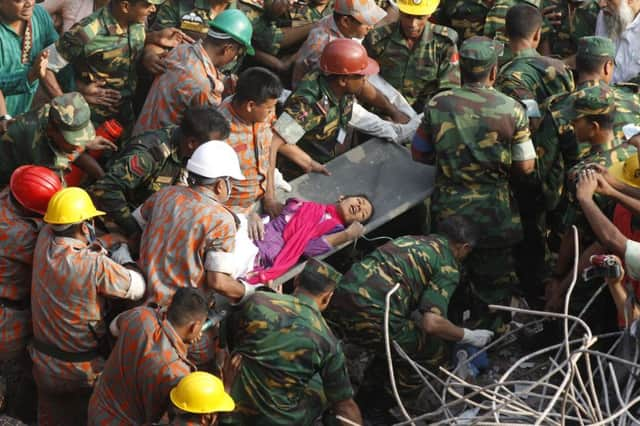Bangladesh court lifts ban on Rana Plaza film


In response to an appeal by the producer of Rana Plaza, a four-member panel of judges led by Chief Justice Surendra Kumar Sinha decided to stay a previous High Court order that banned the release of the film for six months.
Producer Shamima Akhter said the film should be released as the country’s Film Censor Board had earlier approved the screening after cutting some scenes in response to previous court directives.
Advertisement
Hide AdAdvertisement
Hide AdThe film’s director, Nazrul Islam Khan, has argued that the real-life story of Reshma Begum depicts courage amid tragedy. But last month, the High Court banned Rana Plaza after a petition was submitted alleging that the movie has scenes of horror, cruelty and violence that could negatively affect workers in the country’s vital garment industry.
Lawyers said the ruling means there are no more barriers to releasing the film, although it is not clear when that will happen.
The April 2013 disaster killed 1,135 people, with thousands more having to be rescued from the ruins of the illegally built complex which contained five factories that supplied garments to multinational companies.
When the building began collapsing, Ms Begum said she raced down a stairwell into the basement, where she became trapped in a pocket of air. She managed to survive after finding some dried food and bottles of water.
She left the industry and now works in a hotel.
The incident triggered international criticism, and many big clothing brands came forward to help Bangladesh improve work and safety conditions in its garment-making sector.
The collapse of the building is thought to have been caused by overloading of its structure, with machines and generators. The building was constructed on swampy land and the owner illegally added extra storeys.
Bangladesh earns the equivalent of about $25 billion (about £16bn) annually from garment exports, mainly to the United States and Europe, although the country has one of the lowest minimum wages in the world of about $72 (£47) a month.
The industry employs about four million workers, mostly women from rural areas.
Advertisement
Hide AdAdvertisement
Hide AdSpeaking about the film when the ban was first imposed, Mr Khan said: “The Rana Plaza is also about Reshma’s love story, which tries to raise awareness about the life of the country’s millions of woman garment workers.”
The ban was imposed after a petition by the Bangladesh National Garment Workers Employees League, which argued that the film’s use of graphic television footage ran counter to censorship rules, which the court accepted.
The ruling gave the country’s Film Censor Board four weeks to justify its decision to try to give the film a certificate. But the court did not explain why the ban would only apply for six months, or in what circumstances it might be revisited.
Mr Khan said at the time he was confused by the court ruling because he had already cut the scenes that had been deemed “too cruel” by censors.
He added at the time: “I don’t know what prompted the court to ban the film. Rana Plaza movie is about the tragedy at the factory complex.”